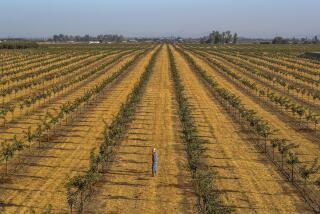State avocado growers seek to block imports
- Share via
California avocado growers are suing the federal government for ending a nearly century-old quarantine and permitting Mexican-grown avocadoes into the state.
The suit contends that the Mexican avocados contain pests that threaten the $341-million California industry.
The Department of Agriculture on Feb. 1 ended a 93-year-old ban. It had been phased out slowly and until this year had limited importation of Mexican avocados to 47 states.
The California Avocado Commission and two growers said the end of the quarantine in California, Florida and Hawaii created “an imminent threat” to the state industry.
“Shipments of infested Mexican avocados are being routinely permitted to enter the U.S. through federally supervised checkpoints,” according to the suit, which was filed in U.S. District Court on Tuesday.
Some imported avocados shipped Feb. 1 were found to contain “scale insects of unknown species or species not known to occur in California,” according to the suit.
The suit asks the court to bar the government from allowing Mexican avocados into California until risks of an insect infestation have been scientifically determined.
USDA officials had not seen the lawsuit and could not comment on it, spokeswoman Andrea McNally said Wednesday in Washington.
The agency’s Animal and Plant Health Inspection Service has been working “very closely with the California Department of Food and Agriculture to resolve the issue” of pests.
In February, state and federal agriculture officials visited Mexican avocado groves and packing houses and U.S. federal inspection points and reviewed “pest risk prevention practices,” she said.
The California Avocado Commission promotes and researches issues related to the production and sale of avocados. It represents about 6,000 commercial avocado growers in the state and their 21,000 employees, the lawsuit said.
More to Read
Inside the business of entertainment
The Wide Shot brings you news, analysis and insights on everything from streaming wars to production — and what it all means for the future.
You may occasionally receive promotional content from the Los Angeles Times.










